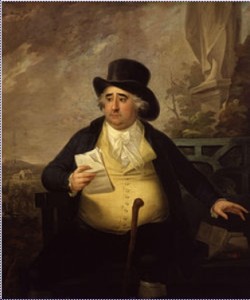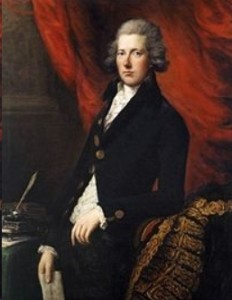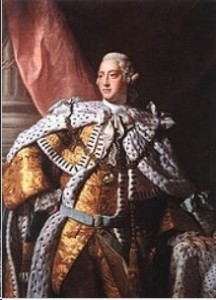
Laurie Alice here,
Since this is January, I wanted to write something that happened in that month during the Regency. Although I know many things did, I ran across something I could not resist writing about, though it takes place twenty-two years earlier than the Regency that has given rise t so many novels and films.
In 1788, George III’s illness manifested itself so severely, many believed he would not recover. Pitt the Younger, prime minister at the time, considered a Regency for the simple fact that it was that or lose his power. Charles Fox, after all, was firmly in the Prince of Wales’ camp and had too great a shot to gain power and depose Pitt without a Regency bill.

Source: Wikipedia
Yes, politics has always been about power.
So, during January of 1789, Pitt set a Regency bill into motion and it was passed by the House of Commons. This bill kept the Prince of Wales under firm control of Parliament with such provisions as how the Prince must keep the King’s present government and he could not manage the king’s real or personal estate without Parliamentary approval. In short, Prinny would be nothing more than a figurehead monarch.
Precedent for the future?
The bill never reached the House of Lords, for the King

Source Wikipedia
recovered by March, but the seeds were planted for the all-important Regency era that made it’s debut in 1811.
For a little extra, here is a poem about the almost Regency, written by Robert Burns, that great Scottish poet whose birthday is celebrated on January 24.
Ode to the departed Regency bill 1789
Daughter of Chaos’ doting years,
Nurse of ten thousand hopes and fears;
Whether thy airy, insubstantial shade
(The rights of sepulture now duly paid)
Spread abroad its hideous form
On the roaring Civil Storm,
Deafening din and warring rage
Factions wild with factions wage;
Or underground, deep-sunk, profound,
Among the demons of the earth,
With groans that make the mountains shake, Thou mourn thy ill-starr’d, blighted birth; Or in the uncreated Void, Where seeds of future-being fight, With lightened step thou wander wide, To greet thy Mother – Ancient Night, And as each jarring, monster mass is past, Fond recollect what once thou wast:
In manner due, beneath this sacred oak,
Hear, Spirit hear! thy presence I invoke!
By a Monarch’s heaven-struck fate!
By a disunited State!
By a generous Prince’s wrongs!
By a Senate’s strife of tongues!
By a Premier’s sullen pride,
Louring on the changing tide!
By dread Thurlow’s powers to awe,
Rhetoric, blasphemy and law!
By the turbulent ocean,
A Nation’s commotion!
By the harlot-caresses
Of borough addresses!
By days few and evil!
Thy portion, poor devil!
By Power, Wealth, Show! The gods by men adored!
By nameless Poverty! their hell abhorred!
By all they hope! By all they fear!
Hear!!! And appear!!!
Stare not on me, thou ghastly Power;
Nor grim with chained defiance lour:
No Babel-structure would I build
Where, Order exiled from his native sway, Confusion may the regent-sceptre wield, While all would rule and none obey:
Go, to the world of Man relate
The story of thy sad, eventful fate;
And call Presumptuous Hope to hear,
And bid him check his blind career;
And tell the sore-prest Sons of Care,
Never, never to despair.
Paint Charles’s speed on wings of fire,
The object of his fond desire,
Beyond his boldest hopes, at hand:
Paint all the triumph of the Portland Band:
Mark how they lift the joy-exulting voice; And how their numerous Creditors rejoice:
But just as hopes to warm enjoyment rise, Cry, Convalescence! and the vision flies.
Then next pourtray a darkening twilight gloom Eclipsing, sad, a gay, rejoicing morn, While proud Ambition to th’ untimely tomb By gnashing, grim, despairing fiends is borne:
Paint ruin, in the shape of high Dundas
Gaping with giddy terror o’er the brow;
In vain he struggles, the Fates behind him press, And clamorous hell yawns for her prey below:
How fallen That, whose pride late scaled the skies!
And This, like Lucifer, no more to rise!
Again pronounce the powerful word;
See Day, triumphant from the night, restored.
Then know this truth, ye Sons of Men!
(Thus ends thy moral tale,)
Your darkest terrors may be vain,
Your brightest hopes may fail.
Originally posted 2014-01-16 10:00:00.
Comments are closed.